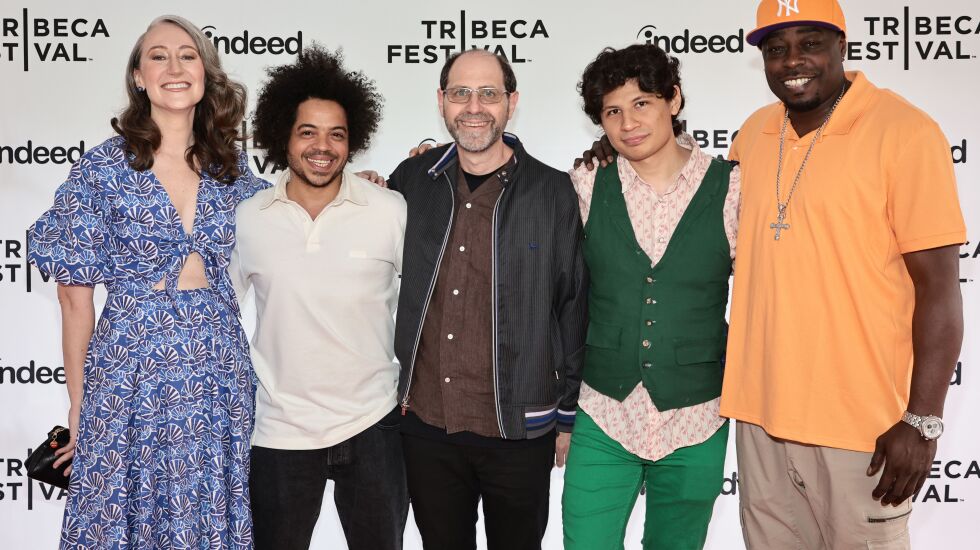
Margaret Ratliff was 20 when she agreed to appear in the 2004 documentary series “The Staircase,” which famously chronicled the case of her adoptive father, Michael Peterson, who was found guilty of killing his wife, Kathleen.
The groundbreaking true-crime series was updated over the years, with Netflix adding all 13 episodes to its catalog in 2018. By then, Peterson had pleaded guilty to a reduced charge of manslaughter, was sentenced to time served and was freed.
In the engrossing, thought-provoking and invaluable documentary “Subject,” directors Jennifer Tiexiera and Camilla Hall catch up with Ratliff and the subjects of other well-known documentaries to see how their lives were affected and how they look back on their experiences. In one of the segments involving Ratliff, she learns that her family’s tragedy will once again be in the spotlight:
“The latest is that HBO Max is now making a series based on the ‘Staircase’ documentary. Colin Firth is playing my dad. … Sophie Turner from ‘Game of Thrones’ is playing me. When I found that out, I thought, ‘This is going to be a thing that people bother me about, and it’s going to make my life harder. The director even emailed me and said, ‘Sophie Turner wants to speak with you about the role.’ And I thought, ‘So you want me to talk about the most traumatic points in my life, that I have spent decades in trauma therapy over, with an actress who then gets paid to play me.’ That’s not right.”
For all of us who are addicted to documentaries, whether of the true-crime, limited-series variety or the type of independent film showcased at Sundance and other film festivals, “Subject” is must-see viewing. This is a documentary about documentaries.
It’s as subjective as any other documentary. But the journey through that rabbit hole will make you stop and think.
It’s a reminder that the “regular people” who become documentary subjects in high-profile projects because their lives are deemed extraordinary or because something extraordinary happened to them or someone they know rarely just go back to a normal existence once the filming has stopped and the editing has been completed and the movie or series is released. (Ratliff, along with Jesse Friedman from “Capturing the Friedmans,” Arthur Agee from “Hoop Dreams” and Ahmed Hassan from “The Square” are listed among the co-producers of the film.)
As “Subject” reminds us, ALL documentaries are shaped from the very start, when a filmmaker decides upon a subject and an approach. Who participates, how they’re edited, what viewpoints are given prominence—obviously, these are all key ingredients informing the viewpoint and tone of the final work. The moment cameras and microphones are introduced into lives, things are affected.
The subjects of documentaries are sometimes quite young and usually completely naïve about what will happen once their stories are released into the world — especially if a documentary becomes a film festival sensation, is picked up by a streaming giant and turns them into celebrities of a sort.
We hear from:
- Jesse Friedman, from the lightning-rod controversial 2003 documentary “Capturing the Friedmans,” who spent 13 years behind bars after pleading guilty to child abuse but said he did so to avoid life in prison and is now a free man.
- Arthur Agee, one of the Chicago high school basketball stars profiled in “Hoop Dreams,” who is now 50.
- And Mukunda Angula, who was locked away, along with his mother and siblings, by his father in their apartment for years, as chronicled in the 2015 documentary “The Wolfpack.” (The charming Angulo notes the irony in him traveling to do publicity for the film: “Talk about not going anywhere, and then completely going everywhere around the world and meeting thousands of people all at once.”)
Most documentary subjects aren’t paid for their time. The thinking goes that doing so might call into question the objectivity of a project.
Still, if a documentary becomes that rare breakout film to reap huge profits, do the directors and producers have an ethical obligation to share the wealth even if no legal obligation exists?
Kudos to the “Hoop Dreams” filmmakers for sharing a cut of the profits with their subjects. Agee estimates that he’s gotten about $500,000 over the years.
These are difficult questions, and “Subject” doesn’t pretend to have the answers. At times, the film seems to be holding up a mirror to a mirror. For instance, one can ask why Margaret Ratliff agreed to participate in this documentary when her life has been so negatively affected by the success of “The Staircase.”
Says Ratliff: “I signed up for this documentary because I wanted other people to have the agency before signing up to be a documentary subject. I didn’t have power. And, if I can give that to other people, it makes me feel a lot better.”
That’s fair and thoughtful. The same could be said of “Subject.”







